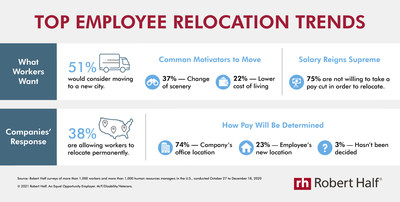New Year, New City? Workers And Managers Reveal Relocation Plans Amid Pandemic
According to a new study by Robert Half, 51% of professionals would consider relocating if offered long-term remote work. Additionally, 4% have already moved. HR managers report that 50% of companies allow temporary relocation, while 38% support permanent moves. Reasons for relocation include a change of scenery (37%) and lower living costs (22%), though 75% of workers are unwilling to accept pay cuts. Companies are reassessing salary structures based on office locations. The rise of remote work is prompting a shift in hiring practices and investments in technology and employee well-being.
- 51% of workers would consider relocating for remote work.
- 50% of companies permit temporary relocation.
- 38% of companies support permanent relocation.
- 75% of workers are unwilling to accept pay cuts for relocation.
Insights
Analyzing...
MENLO PARK, Calif., Jan. 21, 2021 /PRNewswire/ -- A new study by global staffing firm Robert Half shows relocation is a big consideration for professionals and employers right now. More than half of workers surveyed (
View an infographic of the research highlights.
Why Workers Want to Relocate
While the motivation to relocate may vary, common reasons cited by workers include a change of scenery (
"Pre-pandemic, job location was a big factor in where people chose to live," said Paul McDonald, senior executive director at Robert Half. "As many employees continue to work from home successfully, they're considering how a move might improve their quality of life, particularly if they can keep their current salary."
How Employers Are Addressing Pay
As employees set sights on moving to a new city, companies are having to reconsider how they approach pay. HR managers said they will determine salary for current staff who choose to relocate by:
- The company's office location:
74% - The employee's new location:
23% - A decision hasn't been made:
3%
McDonald noted, "While some employees are making temporary moves, the anywhere workforce is here to stay. Adopting a flexible mindset will be critical for companies and professionals who want to thrive in a highly dynamic business environment."
Robert Half identifies three staffing trends driven by the rise of the dispersed workforce:
- The talent pool will become an ocean. As organizations increasingly adopt a remote-first approach, they're realizing the value of recruiting outside their city. Hiring managers can avoid wading through a flood of resumes and gain direct access to top candidates by partnering with a staffing firm.
- Investments are shifting. Companies are channeling more budget into technology that supports secure remote work and seamless collaboration, as well as employee health and well-being programs and benefits.
- Effective onboarding and offboarding are critical. While virtual onboarding has already replaced the in-person orientation process at many organizations, employers also need to reimagine how they handle employee exits from a distance.
About the Research
The online surveys were developed by Robert Half and conducted by independent research firms from October 27 to December 18, 2020. They include responses from more than 1,000 workers 18 years of age or older and more than 1,000 human resources managers at companies in 28 major U.S. cities with 20 or more employees.
About Robert Half
Founded in 1948, Robert Half is the world's first and largest specialized staffing firm. The company has more than 300 staffing locations worldwide and offers hiring and job search services at roberthalf.com. For additional management and career advice, visit the Robert Half blog at roberthalf.com/blog.
![]() View original content to download multimedia:http://www.prnewswire.com/news-releases/new-year-new-city-workers-and-managers-reveal-relocation-plans-amid-pandemic-301212010.html
View original content to download multimedia:http://www.prnewswire.com/news-releases/new-year-new-city-workers-and-managers-reveal-relocation-plans-amid-pandemic-301212010.html
SOURCE Robert Half








